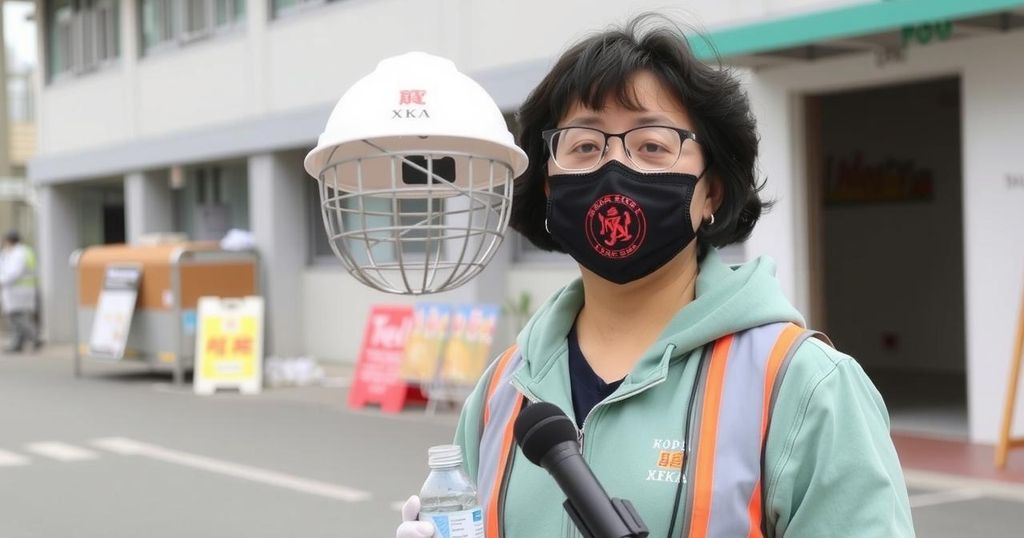Masayuki Fujisawa, a Kobe City employee, shares insights from his year in Suzu, Ishikawa, following the Noto Peninsula Earthquake. He emphasizes the urgency of disaster preparedness in Kobe, informed by his experiences witnessing devastation and recovery efforts. With 566 support workers dispatched nationwide, Fujisawa aims to create a concrete understanding of the importance of preparing for future disasters as Kobe approaches the anniversary of the 1995 earthquake.
On January 3, 2025, a public employee from Kobe City embodied the lessons of resilience by sharing insights gained from his year-long assignment in earthquake-ravaged Suzu, Ishikawa Prefecture. Masayuki Fujisawa, who was dispatched following the devastation caused by the Noto Peninsula Earthquake, emphasized the need for disaster preparedness in his hometown of Kobe, especially as the anniversary of the Great Hanshin Earthquake approaches. Having witnessed the catastrophic consequences of the quake firsthand, he aims to communicate the urgency of disaster readiness effectively.
Fujisawa, who has extensive experience in public service, recalled the traumatic memories recounted by his parents from the 1995 quake in his hometown, urging those living in Kobe to confront the realities of potential disasters. His role included overseeing public relations and delivering critical information to disaster victims, including distributing newsletters throughout temporary housing facilities. He dedicated his efforts to connect with those affected, ensuring they received timely updates on recovery programs.
After his exposure to the aftermath of the Noto Peninsula Earthquake, which left 3,800 structures destroyed or damaged, he reflected on the difficulties faced by survivors, which echoed the challenges experienced in Kobe three decades prior. Shortly after his deployment, he was confronted with the intensity of an aftershock that deeply affected him, reinforcing his appreciation for daily life in Kobe. “How grateful I am to be able to live a normal life in Kobe,” Fujisawa remarked, highlighting the psychological toll of such experiences on individuals.
As he prepares to transition back to Kobe after his assignment, Fujisawa expressed a determination to use the lessons learned in Suzu to enhance public relations efforts. He articulated a vision that focuses on creating a concrete understanding of disaster preparedness among residents, stating, “Even though people know that preparedness is important, few are able to get ready with a concrete image in mind.”
The broader context of Fujisawa’s commitment is illustrated by the deployment of 566 support workers from various municipalities across Japan, who have been mobilized to assist with recovery efforts in Ishikawa Prefecture. This concerted effort reflects the ongoing need for support in the wake of natural disasters, as municipalities often experience worker shortages exacerbated by the dual role of employees as victims of the calamity.
Through his experiences, Fujisawa represents a bridge connecting the memories of past disasters to current efforts aimed at ensuring a more prepared community as Kobe faces its own anniversaries of tragic events. He stands as a reminder of the collective responsibility to remember history and prepare accordingly.
In January 2024, Suzu, Ishikawa Prefecture, suffered substantial damage from the Noto Peninsula Earthquake, which prompted a national response to dispatch workers for recovery efforts. As communities strive to rebuild, the importance of preparedness against future disasters becomes pivotal. Fujisawa’s experience illustrates how memories of past earthquakes shape current attitudes toward disaster readiness, a theme that resonates in regions vulnerable to seismic activity such as Kobe, where the 1995 Great Hanshin Earthquake had a profound impact.
In summary, Masayuki Fujisawa’s commitment to transferring lessons from the Noto Peninsula Earthquake to promote disaster preparedness in Kobe highlights the importance of community resilience. By leveraging personal experience and connecting with local citizens, he embodies a proactive approach to disaster management, which remains critical as Kobe approaches the anniversary of its significant earthquake. Fujisawa’s work serves as a crucial link between understanding historical events and applying that knowledge to foster a safer future.
Original Source: japannews.yomiuri.co.jp






